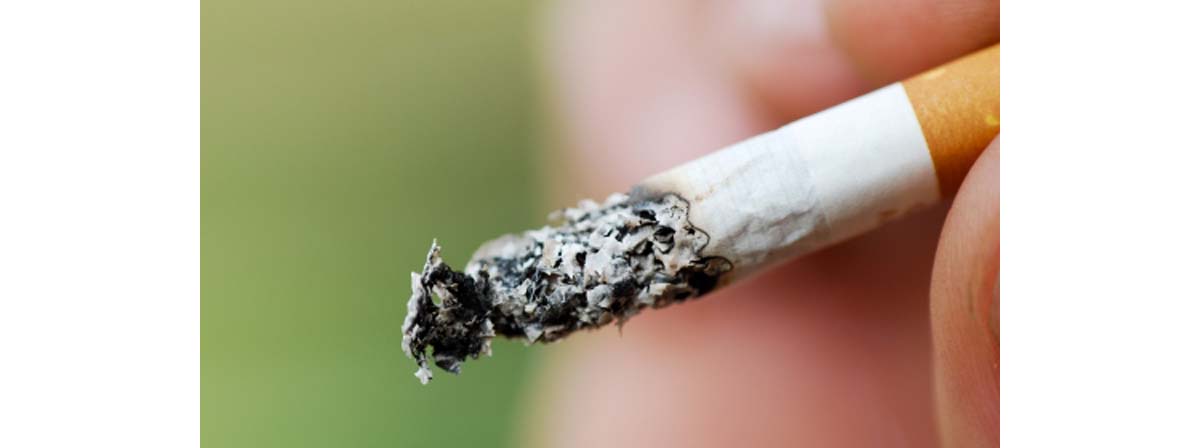"I became a regular smoker at 17 after first trying weed," Margiet shared.
Tom's dad smoked, as did many of his mates, so he quite naturally picked the habit up at 16.
Helen's relationship with nicotine began when she was 13, after a boyfriend introduced her.
Their stories have got to sound familiar to anyone who's ever smoked. Smoking rates have been declining, but around 3,200 United States teens will still light up their first cigarette today, while about 2,000 of their peers will go from the occasional puff to a daily smoking habit.
Can we blame underdeveloped prefrontal cortexes, that make smoking appear both grown-up and edgy? Plain old peer pressure, society, advertising, misinformation?

Whatever gets a particular person into cigarettes to begin with, we all know what they're not thinking when they take that first drag: "Ah, this is the start of a life-long addiction to something that's eventually going to kill me slowly and painfully, after many years of wishing I could stop but finding out that the old saying that quitting nicotine is no easier than quitting heroin really is true."
"The first cigarette was beyond disappointing," Helen shared. "Why, I asked myself, do people do this? There was no buzz, no high, no nothing — just a disgusting taste. Learning to appreciate cigarettes took time. The time it took to get addicted."
Nobody knows exactly what they are getting into when they smoke their first cigarette. They don't know that a puff will turn into a cigarette, that a cigarette will turn into a pack, and that a pack will turn into countless packs.
Relapsing smokers, however, are different. Those who have already quit before, sometimes for many years, only to decide (and make not mistake: it is a decision) to light up again ought to know better.
How Nicotine Addiction Works
When you lit up that first cigarette (or, in some cases, another nicotine-delivery method such as chewing or vaping), something unprecedented happened in your brain: you introduced nicotine, which is, by the way, the tobacco plant's natural defense system against pests, to your system. As you continued using nicotine, your body grew used to some pretty complex processes.
Nicotine introduces a "fight or flight" situation to your body, binding to your fast-acting acetylcholine receptors and tricking it into thinking something big is happening. While your heart beats faster and your blood vessels are being constricted, the neurotransmitters norepinephrine, serotinin and dopamine start messing with your brain. Once your brain is used to the presence of nicotine, something that can happen rather rapidly, you'll start "going crazy" when you haven't had a smoke for a whole; you get a craving. It's not that nicotine inherently makes you feel better, it's that its lack makes addicts feel terrible, and reintroducing it to the system makes them believe that smoking takes their stress away.
READ Hypnosis to Quit Smoking and Stop Addictions - Hypnosis as Addiction Treatment
Remain a smoker, and a Pavlovian bond will form between you and cigarettes. Whether that morning coffee, that work break, meeting those mates at the pub, feeling stressed, or that after-sex glow makes you want to have a smoke largely depends on the situations in which you used nicotine.
When you quit smoking, nicotine will be out of your system within 72 hours, and your physical addiction will be on its way out. Your brain is a powerful machine, however, and the Pavlovian bond is much harder to break. You get used to not smoking in certain situations by not smoking in those situations; you're retraining your brain, basically. Not all situations happen every day, though. Years after quitting, the death of a friend, your father's lung cancer diagnosis, or that new boyfriend who smokes, make reignite that old spark.
Why Long-Term Quitters Start Smoking Again (And How You Can Avoid Joining Them)
The Danger Zone
Nicotine withdrawal is a sucky process, but quitting and staying quit does become much easier as time passes. Many quitters report that the three-day, three-week, and three-month marks give them grief, and that they continue to have occasional intrusive thoughts about smoking even beyond that, during important times of their lives.
Former smokers seem to take cigarettes up again after a long-term quit for three distinct reasons:
- They convinced themselves that they would be able to smoke the odd cigarette here and there now that their "addiction was under control".
- A life-changing and stressful event had them running back to cigarettes.
- Their short-term reason to quit, such as pregnancy, expired.

Helen's 17-year old son had a part-time retail job and offered to pay for his mom to quit smoking with the medication Zyban. Encouraged by her son's determination, Helen decided to commit to giving up, and remained smoke-free for a full 18 months.
She said:
"Then, I met this nice fella, my current boyfriend. We used to go to the pub together and he happened to be a heavy smoker. Somehow the thought that I could have a fag here and there seemed really appealing at the time. I remember my friend telling me off and saying you should not do that, but hey, I did it anyway. Now three years later, I'm back to chain smoking."
Was it worth it? "Definitely not. I should have listened to my friend," Helen shares. "I should never have convinced myself that I could be a social smoker. I was never able to be one before my quit, so why should this time be any different?"
Helen remains a smoker with no real plans to quit.
Tom's relapse, on the other hand was caused by a very powerful smoking trigger:
"I quit cold turkey because I had had enough of this shit, OK, and to save some money. OK, a lot of money actually. I lasted like that for seven years. Then my dad was admitted to hospital. Lung cancer! The first thing I did was go outside, spotted a smoker and asked him for a cigarette. That was me back to square one. Ironically. My dad died two years after. Nothing they could do after chemo, what have you. That's when I decided, no more of this. After we buried my dad, I smoked my last one and vowed never to go back. I don't want to end up like him. Lung cancer is heartbreaking. Nobody wants to go like that."
Margiet explains:
"I smoked until I was expecting a baby, then gave up straight away. Then started again seven years later, because I started working for someone who smoked and it just happened. Then gave up again three later, only to relapse a year after because my sister committed suicide. Then I was diagnosed with high blood pressure and my doctor told me to stop so I did. I smoked my last pouch of of roll-ups. I have been clean now for over 12 years and I still like the smell of a freshly lit cigarette but to be in a room of smoke makes me feel sick. I'm pretty sure I'm not going to relapse because I don't fancy it any more and my brain doesn't make me want to do it any more. It just disgusts me, basically."
Committing To A Life Without Cigarettes
All these people have one thing in common: they lost sight of the harsh realities of their nicotine addictions when they started smoking again. Their junkie thinking convinced them that "just one cigarette" would help them feel better, or that they could have a smoke occasionally now that they were "no longer addicted".
READ E-Cigarettes And Smoking Cessation
Two of them decided to try again, and their successful quits share a common thread as well. Tom and Margiet want to remain quit more than they want to smoke. They know full well that they are one puff away from a pack a day, as people in the quit-smoking community like to say. They know that, like sober alcoholics, they'll always be addicted, that they are "nicoholics". The know that smoking won't make them feel better, and just make them want to smoke more. They know that cigarettes cannot light themselves, that it takes their conscious decision to buy and light them to cause them to relapse.
- Photo courtesy of grodt1987: www.flickr.com/photos/35470384@N02/4751188109/
- Photo courtesy of livingwithgiants: www.flickr.com/photos/livingwithgiants/4650214301/
- Photo courtesy of livingwithgiants: www.flickr.com/photos/livingwithgiants/4650214301/


Your thoughts on this